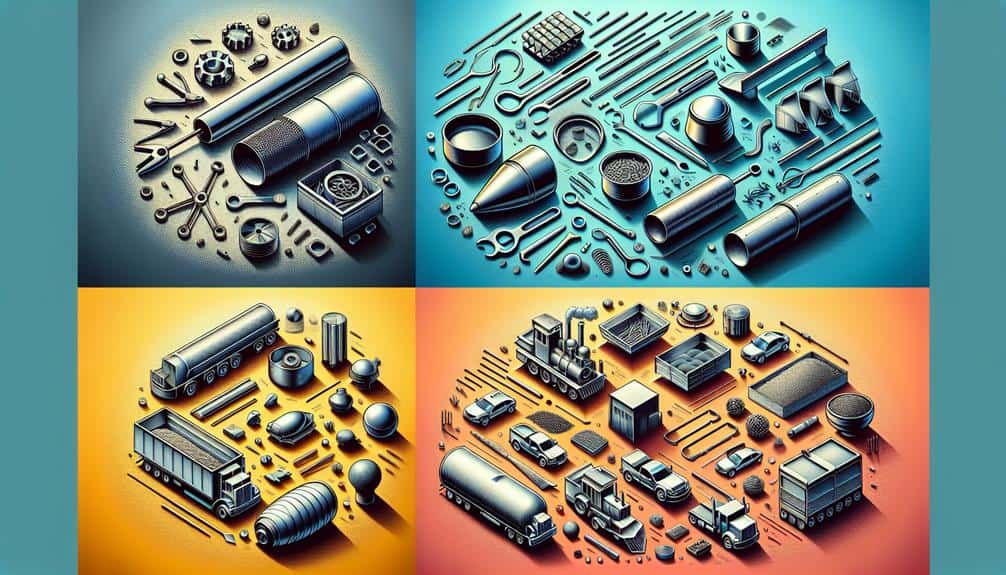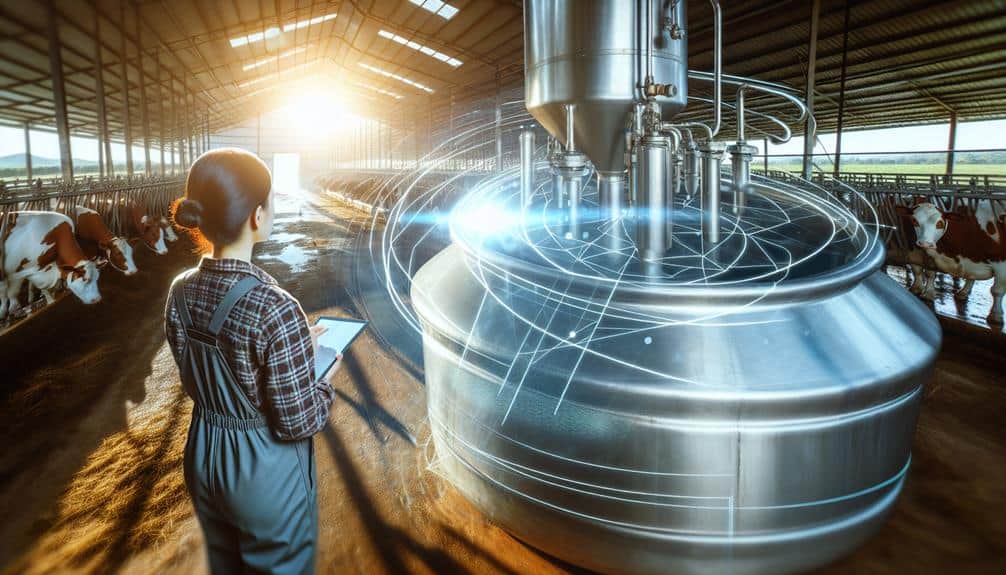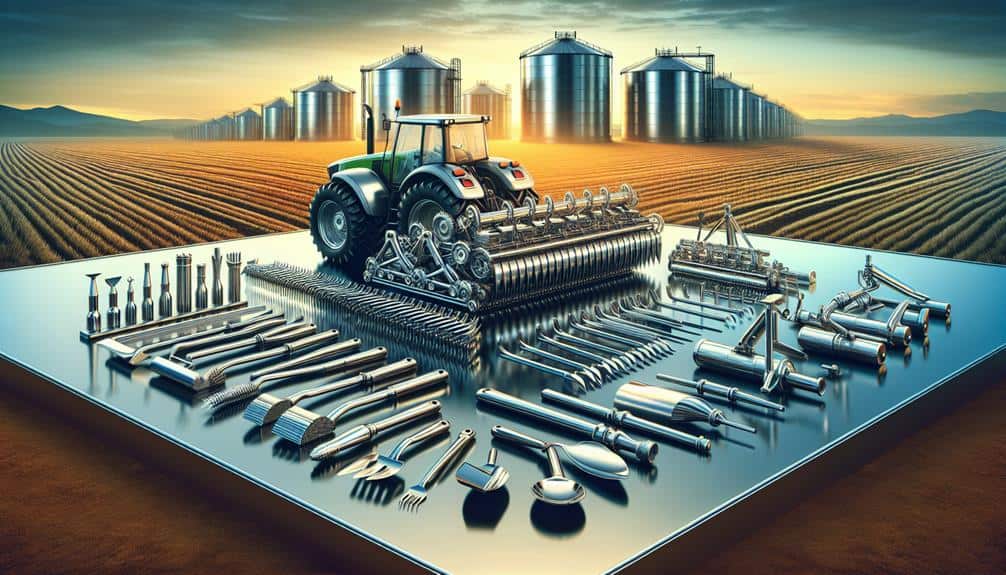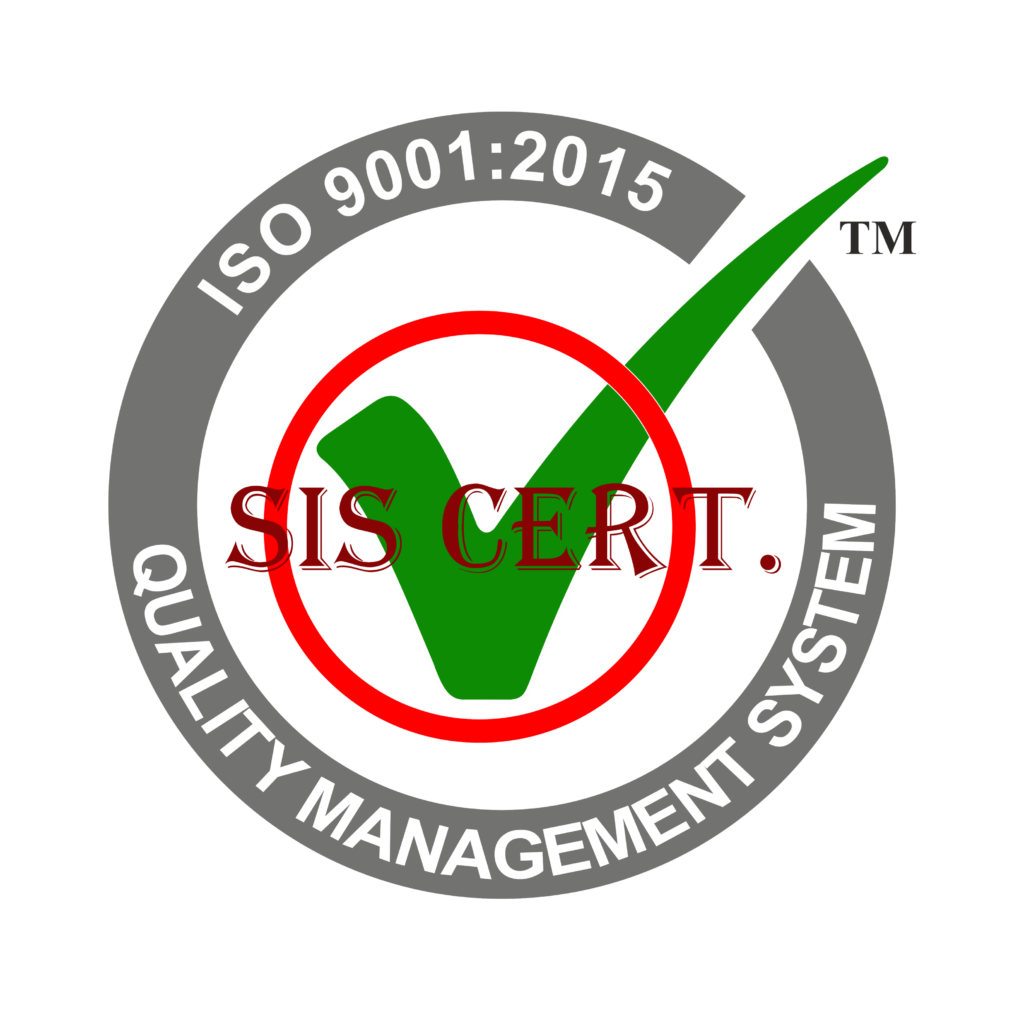Are you ready to fortify your agricultural operations with the steel that withstands the test of time?
Stainless steel has become an essential component in the agricultural sector, offering a robust and resilient solution to the challenges faced in farming and food production.
From heavy-duty equipment to essential structures, stainless steel’s remarkable properties have positioned it as a game-changer.
As you consider the potential benefits of integrating stainless steel into your agricultural practices, you’ll uncover a world of possibilities that could revolutionize your approach to farming.
Key Takeaways
- Stainless steel offers excellent corrosion resistance, making it suitable for harsh farming environments.
- Stainless steel is non-reactive and does not contaminate crops or food, ensuring safety for consumption.
- Stainless steel provides durability and strength in farming structures, even in coastal areas or high-salt content environments.
- Stainless steel fasteners offer superior strength, durability, and corrosion resistance, making them ideal for various farming applications.
Stainless Steel in Agricultural Sector

Stainless steel plays a crucial role in the agricultural sector, offering unparalleled durability, corrosion resistance, and efficiency in various farming applications. The advantages of stainless steel in farming equipment are significant.
It provides excellent corrosion resistance, ensuring safety for consumption by being non-reactive and not contaminating crops or food. The material is available in different grades with specific properties suited for various applications. Moreover, stainless steel structures offer both durability and aesthetic appeal, with resistance to corrosion even in coastal or high-salt content environments.
In terms of maintenance, stainless steel requires minimal upkeep, making it cost-effective in the long run. However, challenges such as initial cost and the need for specialized equipment for fabrication exist.
Innovations in stainless steel fasteners have been pivotal, offering superior strength, durability, and corrosion resistance, catering to specific farming needs. The sustainability of stainless steel in the agricultural sector is evident through its long-lasting benefits with minimal maintenance, making it a valuable and eco-friendly choice for farming and structural applications.
Why Stainless steel For The Agricultural Sector?
In the context of the agricultural sector, stainless steel stands out as a highly advantageous material due to its unparalleled durability, corrosion resistance, and efficiency in various farming applications.
The advantages of stainless steel in the agricultural sector are evident in the improved equipment durability, reduced maintenance headaches, increased crop value, corrosion resistance to agrochemicals, and easy cleaning with minimal maintenance.
Stainless steel’s exceptional durability ensures that farming equipment can withstand the harsh conditions and heavy usage typically experienced in agricultural settings, leading to a longer lifespan and reduced need for frequent replacements.
Additionally, the corrosion resistance to agrochemicals ensures that the equipment remains intact and functional even when exposed to substances that may degrade other materials. This resistance not only reduces maintenance headaches but also contributes to the increased value of the crop by ensuring that the equipment maintains its effectiveness over time.
Furthermore, the ease of cleaning and minimal maintenance requirements associated with stainless steel contribute to operational efficiency, allowing for more focus on farming activities and less on equipment upkeep.
Types Of Stainless Steel

When considering stainless steel for agricultural applications, it’s crucial to understand the different types available. Austenitic stainless steel, known for its excellent formability and corrosion resistance, is commonly used in the food and agricultural sectors.
Ferritic stainless steel, with its high resistance to stress corrosion cracking and oxidation, finds applications in automotive parts and industrial machinery.
Additionally, martensitic stainless steel, prized for its high strength and durability, is often utilized in the food industry, medical equipment, aerospace, and automotive applications.
austenitic
Austenitic stainless steel, widely used in the food and agricultural sectors, transportation, industrial, and architectural applications, exhibits exceptional corrosion resistance and strength properties.
This type of stainless steel offers numerous benefits, including unparalleled corrosion resistance, ensuring durability of equipment in harsh farming environments. Its maintenance advantages are evident in its ease of cleaning and sanitization, making it ideal for food processing and storage.
The durability of austenitic stainless steel ensures the longevity of farming structures, providing a cost-effective solution in the long run. Additionally, its high strength-to-weight ratio makes it suitable for various structural designs, offering innovation and efficiency in agricultural applications.
With its ability to withstand exposure to sulfates, nitrates, and chlorides found in fertilizers and pesticides, austenitic stainless steel plays a crucial role in overcoming mechanical damage in farming, thereby enhancing productivity and sustainability.
ferritic
Ferritic stainless steel, known for its magnetic properties and high resistance to corrosion, is commonly used in manufacturing automotive parts, industrial machinery, and kitchen wares. In the agricultural sector, the properties of ferritic stainless steel make it an ideal choice for various applications. Its corrosion resistance and durability make it suitable for agricultural machinery, ensuring longevity and reliability in farming environments. The table below outlines the key properties and benefits of ferritic stainless steel in agricultural applications.
| Property | Benefit |
|---|---|
| Corrosion Resistance | Withstands harsh farming environments |
| Durability | Ensures longevity and reliability in farming |
Ferritic stainless steel’s unique properties make it a valuable material for agricultural equipment, offering high performance and long-term benefits in demanding farming conditions.
duplex
With its magnetic properties and high resistance to corrosion, ferritic stainless steel has proven to be an ideal material for various agricultural applications.
Now, let’s explore the unique characteristics of duplex stainless steel. Duplex stainless steel is a combination of austenitic and ferritic stainless steels. It offers exceptional corrosion resistance, making it well-suited for agricultural structures and equipment.
In addition to its corrosion resistance, duplex stainless steel also has higher strength compared to standard austenitic stainless steel grades. This makes it ideal for demanding agricultural environments where durability is crucial.
Furthermore, duplex stainless steel provides excellent performance for stainless steel fasteners in agricultural machinery. Its corrosion resistance and strength ensure durability and reliability in harsh conditions.
martensitic
You can explore the unique properties and applications of martensitic stainless steel within the agricultural sector, showcasing its distinct characteristics and benefits for farming equipment and structures.
Martensitic stainless steel offers exceptional corrosion resistance, making it well-suited for harsh farming environments and protection against agrochemicals. Its durability in farming equipment helps prevent mechanical damage, ensuring long-lasting benefits and reducing maintenance requirements.
The material’s high strength and resistance to corrosion make it ideal for a wide range of agricultural applications. Its ability to withstand exposure to sulfates, nitrates, and chlorides found in fertilizers and pesticides further enhances its suitability for the agricultural sector.
Martensitic stainless steel presents a valuable solution for farming equipment and structures, providing reliability and longevity in demanding agricultural settings.

Top Applications & Uses Of Stainless Steel In The Agricultural Sector
Stainless steel finds diverse applications in the agricultural sector. This includes skin care, dairy farming, feeding and watering systems, and farm barrier accessories. The use of stainless steel in other farm equipment also contributes to its significance in agriculture.
Its corrosion resistance, durability, and ease of maintenance make it an ideal choice for various agricultural applications. This ensures efficient and long-lasting performance in the demanding farming environment.
Skin Care
Skin care in the agricultural sector relies on the versatile applications of stainless steel for maintaining hygiene and durability in equipment used for grooming and caring for animals.
-
Stainless Steel Brushes
-
Durable brushes made of stainless steel ensure effective grooming and hygiene for animals, promoting their well-being and health.
-
The corrosion resistance of stainless steel brushes ensures longevity and reliability in agricultural settings.
-
Stainless Steel Containers
-
Stainless steel containers provide a hygienic and durable solution for storing grooming products, animal feed, and other essentials.
-
These containers offer resistance to corrosion, ensuring the integrity of stored products and promoting animal hygiene.
Dairy Farming
The use of stainless steel in dairy farming extends beyond skin care applications, encompassing essential equipment and structures that uphold hygiene and durability standards in the agricultural sector. Stainless steel outperforms mild steel in dairy farming equipment due to its exceptional durability and corrosion resistance. In food processing, stainless steel ensures the safety and cleanliness of dairy products, surpassing mild steel in hygiene standards. Its corrosion resistance makes it ideal for containers, buckets, and other equipment used in dairy farming. The following table highlights the advantages of stainless steel over mild steel in dairy farming equipment:
| Aspect | Stainless Steel | Mild Steel |
|---|---|---|
| Durability | Exceptionally durable in harsh farming environments | Prone to corrosion, rust, and deformation |
| Corrosion Resistance | Offers excellent resistance, ensuring safety for consumption | Susceptible to corrosion, posing contamination risks |
| Hygiene Standards | Easy to clean and sanitize, meeting stringent hygiene requirements | Prone to contamination, necessitating frequent cleaning |
Stainless steel’s resilience and hygiene properties make it indispensable in dairy farming equipment, ensuring the safety and quality of dairy products.
Feeding & Watering Systems
When designing feeding and watering systems for the agricultural sector, prioritizing materials with exceptional durability and corrosion resistance is essential to ensure long-term performance and minimal maintenance requirements. Stainless steel offers the ideal solution, providing the following benefits:
-
Efficiency and Productivity
-
Stainless steel feeding and watering systems contribute to efficient feeding and watering processes, enhancing overall productivity.
-
Cost Effectiveness and Long Term Savings
-
Stainless steel’s longevity and minimal maintenance requirements result in cost savings over the long term.
These systems also prioritize:
-
Safety and Hygiene
-
Stainless steel’s hygienic properties ensure the safety of feed and water for livestock.
-
Customization and Versatility
-
Stainless steel systems can be customized to fit specific farm requirements, offering versatility in design and functionality.
-
Environmental Sustainability
-
Stainless steel is environmentally sustainable, being 100% recyclable and contributing to sustainable farming practices.
Farm Barrier Accessories
Stainless steel plays a crucial role in the agricultural sector, particularly in the construction of farm barrier accessories for creating effective and durable barriers.
The durability of stainless steel makes it an ideal choice for farm barrier design, providing corrosion resistance benefits essential for withstanding harsh environmental conditions.
Its low maintenance requirements offer cost-effective solutions for long-term use.
The material’s strength and resistance to corrosion make it suitable for creating robust and long-lasting barriers, ensuring the safety and security of farming operations.
The ease of maintenance of stainless steel farm barriers contributes to their long-term cost-effectiveness, making them a reliable choice for agricultural applications.
Other farm Equipment
Utilizing stainless steel for various agricultural equipment enhances durability and minimizes maintenance requirements, providing long-term cost-effective solutions for farming operations.
-
Sustainable Farming
-
Stainless steel equipment promotes sustainable farming practices by withstanding harsh environmental conditions and reducing the need for frequent replacements.
-
Improved Crop Yield
-
Stainless steel equipment contributes to improved crop yield through its durability and resistance to corrosion, ensuring that the equipment continues to function optimally over time.
-
Efficient Irrigation Systems
-
Stainless steel components in irrigation systems provide longevity and resistance to corrosion, contributing to the efficiency and reliability of the irrigation infrastructure.
-
Soil Health Management
-
Stainless steel equipment supports soil health management by minimizing the risk of contamination and maintaining the integrity of agricultural processes.
-
Precision Agriculture Techniques
-
Stainless steel equipment aligns with precision agriculture techniques, offering reliability and longevity in the implementation of advanced farming methodologies.
Stainless steel advantages in agriculture
Stainless steel offers numerous advantages in agriculture. These include durability of equipment, reduced maintenance requirements, and increased crop value. Its corrosion resistance to agrochemicals, ease of cleaning, and minimal maintenance make it a valuable material for agricultural applications. Additionally, the longevity and efficiency of stainless steel equipment contribute to decreased downtime for repairs and ultimately lead to increased productivity.
Stainless Steel Features & Benefits in agriculture
Stainless steel offers various advantages in agriculture. These include exceptional corrosion resistivity, easy fabrication, moisture endurance, hygienic properties, and ease of cleaning.
These features make stainless steel an ideal choice for agricultural equipment, structures, and fasteners. The material’s ability to withstand harsh farming environments, resist corrosion from agrochemicals, and provide low maintenance requirements contributes to its value in the agricultural sector.
Corrosion Resistivity
With an unparalleled resistance to corrosion and rust, stainless steel stands as a superior material choice for agricultural applications.
-
Corrosion Testing:
-
Stainless steel undergoes rigorous corrosion testing, ensuring its reliability in harsh agricultural environments.
-
Alternative Materials:
-
Comparison with alternative materials highlights stainless steel’s superior corrosion resistivity.
-
Maintenance Requirements:
-
Stainless steel’s low maintenance needs result in cost savings and reduced environmental impact.
Easy Fabrication
Easy fabrication of stainless steel in agricultural applications ensures efficient manufacturing processes and versatile structural designs. Utilizing advanced fabrication techniques, welding processes, and machining methods, stainless steel enables precise customization for farming equipment.
Cutting tools and surface finishes further enhance the adaptability of stainless steel, making it a preferred choice for agricultural structures and machinery. Its ease of fabrication contributes to innovative solutions in the agricultural sector, meeting the demand for efficient and durable equipment.
Moisture Endurance
Moisture endurance is a critical factor in the performance and longevity of agricultural equipment, especially in environments with high humidity and moisture levels.
-
Moisture resistance:
-
Stainless steel exhibits exceptional resistance to moisture, preventing corrosion and rusting.
-
This ensures the durability of equipment in harsh agricultural environments.
-
Maintenance benefits:
-
Stainless steel’s moisture endurance reduces maintenance requirements, offering long-term cost savings and operational efficiency.
Hygienic
The exceptional resistance of stainless steel to moisture ensures the hygienic integrity of agricultural equipment, making it an essential feature for maintaining safety and cleanliness in farming environments.
Its hygienic properties, durability benefits, corrosion resistance, and easy maintenance contribute to the temperature performance, ensuring a high level of cleanliness and safety in agricultural operations.
Stainless steel’s ability to withstand harsh conditions while maintaining its hygienic properties makes it an ideal choice for agricultural applications.
Easy To Clean
Stainless steel’s cleanability and low maintenance requirements make it a highly advantageous material for agricultural applications, ensuring efficient and hygienic operations.
-
Easy Maintenance
Stainless steel’s smooth surface allows for easy and efficient cleaning, reducing downtime and labor costs. -
Sanitation Advantages
Its non-porous surface prevents the accumulation of dirt and bacteria, ensuring high levels of cleanliness and food safety.
Temperature Resistance
Temperature resistance is a crucial factor to consider in agricultural applications, especially in maintaining the efficiency and longevity of equipment and structures. Stainless steel’s exceptional temperature resistance provides durability advantages, maintenance benefits, and corrosion resistance, ensuring the integrity of agricultural equipment and structures.
This resistance also contributes to easy cleaning and hygiene maintenance, making stainless steel an ideal choice for agricultural applications where temperature variations and harsh environments are common.
Recyclable
Recyclable stainless steel offers a sustainable and environmentally friendly solution for agricultural applications, contributing to the industry’s overall commitment to eco-conscious practices and resource efficiency.
-
Environmental sustainability
-
Stainless steel’s 100% recyclability reduces environmental impact.
-
Sustainable material choice aligns with modern eco-friendly agricultural practices.
-
Economic viability
-
Recycling stainless steel reduces raw material usage, lowering production costs.
-
Long-term cost benefits from reduced environmental impact and resource conservation.
Frequently Asked Questions
What Are the Specific Challenges and Benefits of Using Stainless Steel in the Agricultural Aviation Industry?
You’ll find specific challenges and benefits when using stainless steel in the agricultural aviation industry. Stainless steel provides durability, efficiency, and chemical resistance, overcoming challenges like corrosion and offering long-lasting benefits for agricultural equipment.
How Does Stainless Steel Compare to Other Materials in Terms of Longevity and Efficiency in Agricultural Equipment?
Stainless steel surpasses other materials in longevity and efficiency in agricultural equipment. Its exceptional corrosion resistance, durability, and low maintenance costs make it the premier choice for sustainable and high-performance farming operations.
Can Stainless Steel Withstand the Harsh Chemical Components Found in Modern Agrochemicals and Pesticides?
Stainless steel demonstrates exceptional corrosion resistance and durability against harsh chemical exposure, making it ideal for agrochemicals and pesticides in agricultural equipment. Its chemical resistance ensures farming sustainability and the longevity of stainless steel.
What Are the Key Research and Innovation Initiatives That Zanoni Equipamentos Is Undertaking to Improve Stainless Steel Equipment for Agriculture?
To improve stainless steel equipment for agriculture, Zanoni Equipamentos is spearheading research initiatives and innovation advancements. They’re addressing material challenges, longevity comparison, and chemical resistance to enhance equipment efficiency and environmental impact in agricultural applications.
How Does the Use of Stainless Steel in Agriculture Contribute to the Overall Sustainability and Environmental Impact of Farming Practices?
Using stainless steel in agriculture enhances sustainability and reduces environmental impact. Its durability and chemical resistance lead to decreased maintenance, increased efficiency, and prolonged equipment lifespan. Research and innovation drive continuous improvement.
Conclusion
In conclusion, stainless steel offers numerous benefits for the agricultural sector. These benefits include corrosion resistance, high strength, and easy maintenance. Additionally, stainless steel structures have a lifespan of over 100 years, making them a cost-effective and durable investment for farmers.
Stainless steel’s ability to withstand harsh environments and ensure the safety of crops and food is truly revolutionizing and elevating agricultural operations. It is clear that stainless steel is playing a crucial role in the advancement of the agricultural industry.


